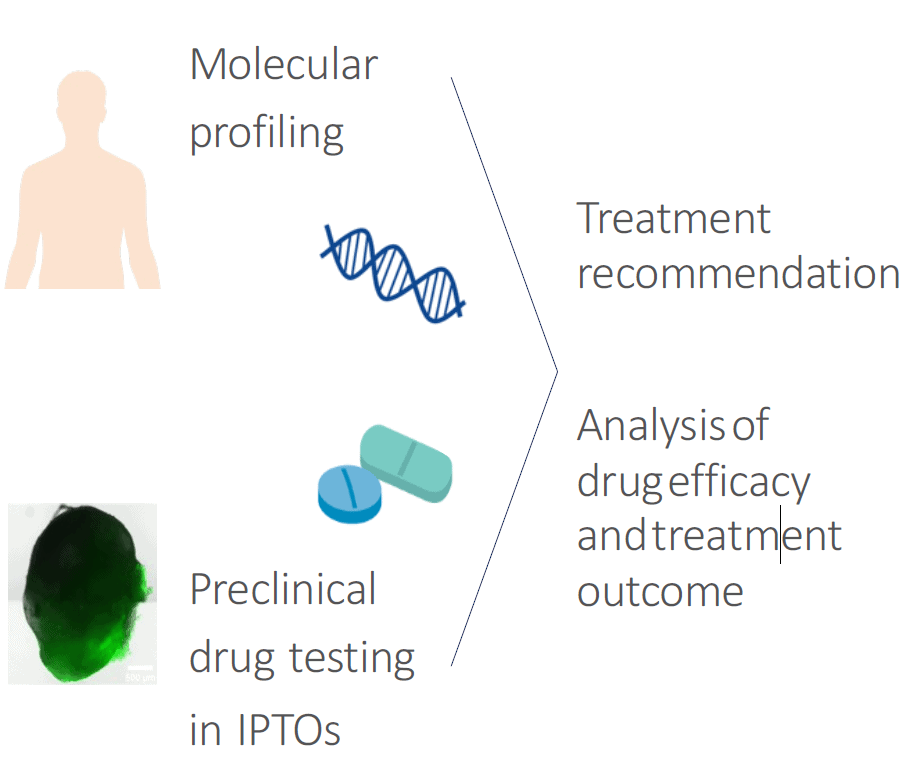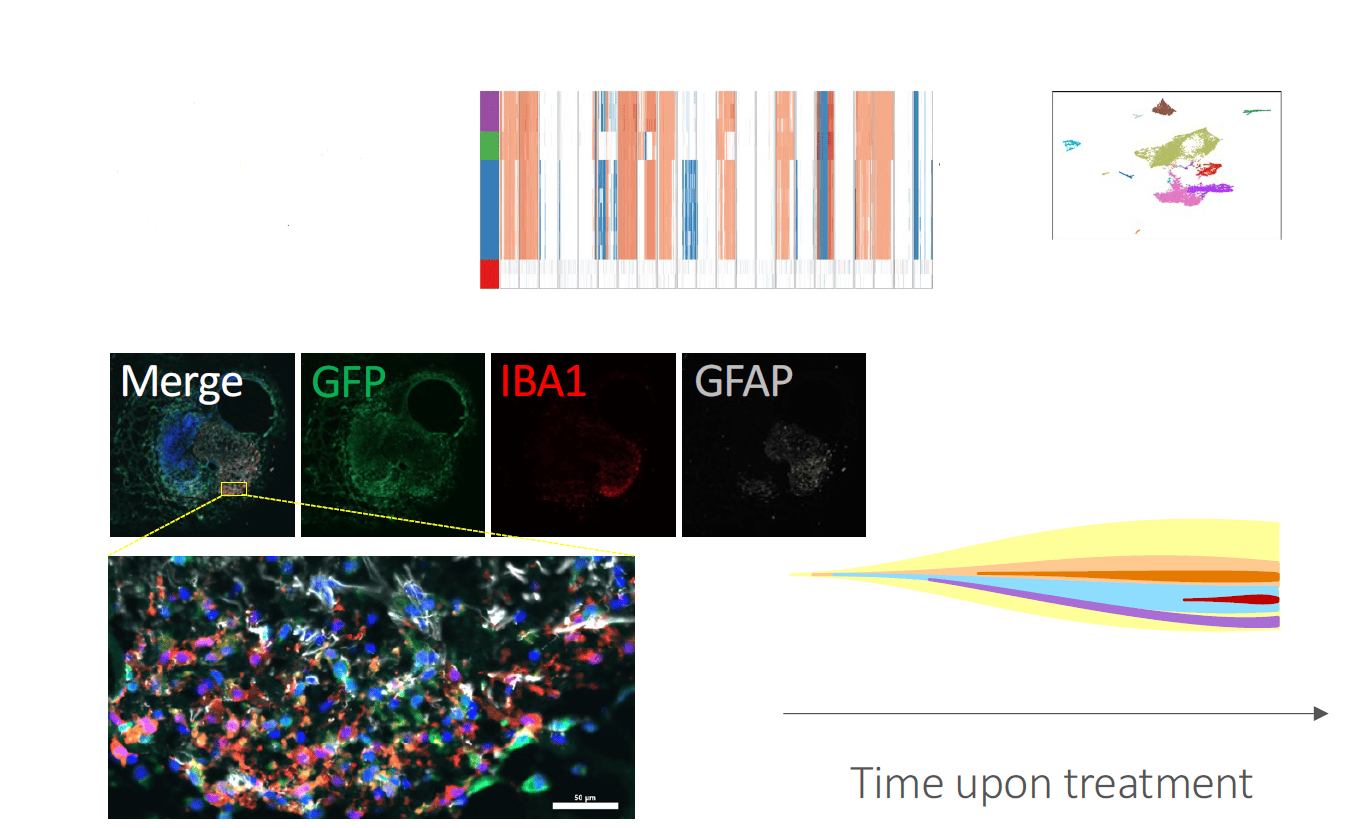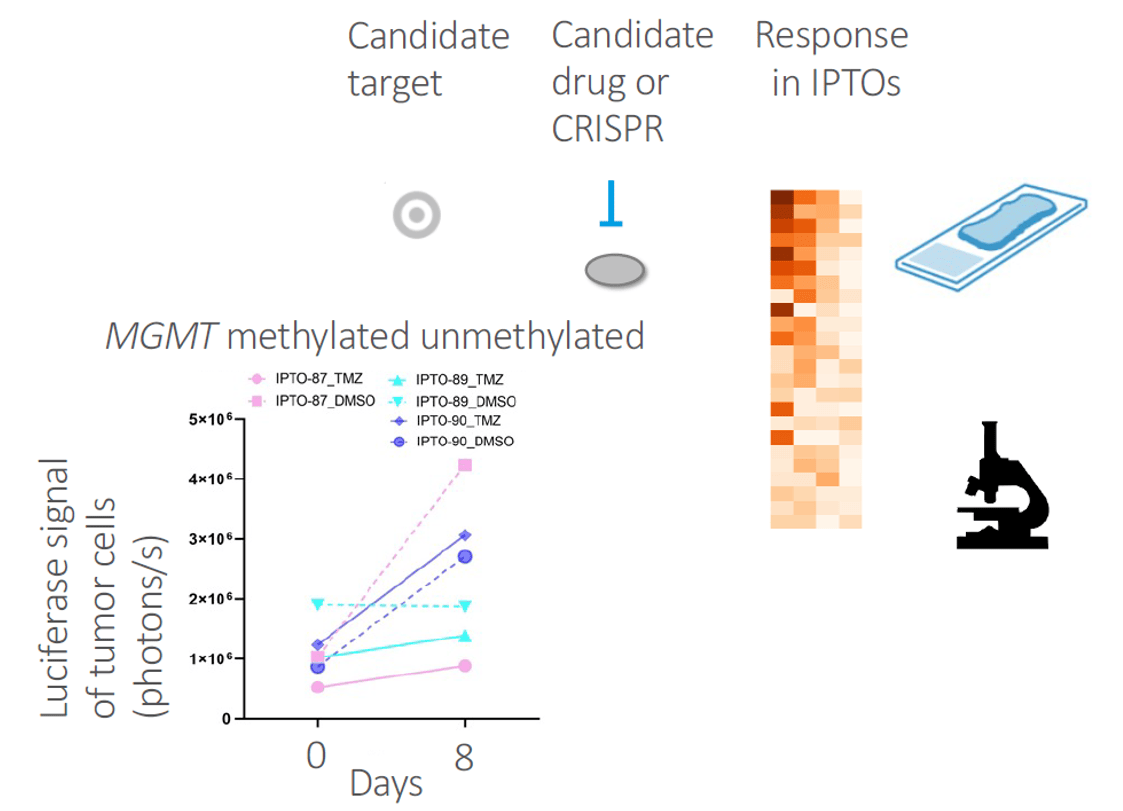Research > Focus A > Work Packages A08
Summary
This project leverages recently established human glioblastoma organoid models to lay the groundwork for future molecularly stratified studies. We will integrate patient-derived organoids to drug screening pipelines to complement druggable target prioritization from molecular profiling. Using single-cell genomics, we will longitudinally map the clonal evolution of treatment-sensitive and resistant organoids to dissect the genetic and transcriptional mechanisms of resistance.
Task 1
Personalized treatment optimization based on drug sensitivity tests using IPTOs
Steps / Workflow
- Predictive preclinical test of possible treatment options derived from molecular profiling of patient tumors
- Drug testing in IPTOs
- Long-term goal: submission of results for tumor molecular board discussion
Task 2
Harnessing IPTO models to tackle therapeutic resistance
Steps / Workflow
- Longitudinal map of clonal evolution: resistant clones selected or appearing upon treatment?
- Alterations and complex rearrangements in resistant clones for all treatment arms: competitive advantages for clonal fitness?
- Transcriptional programs and cell states driving resistance
- Pathways activated in resistant clones as candidate targets
Task 3
Validation of candidate targets to overcome treatment resistance
Steps / Workflow
- Validations and functional assays in IPTOs to block transcriptional regulatory machinery leading to resistance
- Response of IPTOs quantified by luciferase imaging
- IPTO tissue collected: histological analysis of cellular and molecular effects of target inactivation (e.g. on proliferation, apoptosis, senescence, invasion)
- Drugs that demonstrate positive response selected for possible clinical evaluation

ERNST, AURÉLIE, PD Dr. rer. nat.
Genome Instability in Tumors, German Cancer Research Center, Im Neuenheimer Feld 280, 69120 Heidelberg, Germany

LIU, HAI-KUN, PhD
German Cancer Research CenterBrain Cancer Division of Molecular Neurogenetics, Im Neuenheimer Feld 280, 69120 Heidelberg, Germany
Address
Im Neuenheimer Feld 400
69120 Heidelberg
Themen
Research
- Focus A
- A01: Targeting tumor cell network communication to overcome primary and adaptive resistance in glioblastoma
- A02: Development of a specific combination therapy for histone H3-mutant pediatric glioblastoma
- A03: Deciphering resistance against targeted treatments
- A04: Elucidating tumor-associated microglia interactions in astrocytomas CNS WHO-grade 4
- A05: Predictive biomarkers for MGMT-promoter-methylated glioblastoma (2019 – 2023)
- A06: Resistance mechanisms of glioblastoma against alkylating agents and radiotherapy
- A07: Mapping and targeting neuron-tumor networks to tackle therapy resistance in glioblastoma
- A08: Personalized glioblastoma treatment guided by patient-derived tumor organoids
Research
- Focus B
- B01: Mechanisms of response and resistance to glioma-specific t cells
- B02: DNA mis-match repair regulates immune checkpoint blockade therapy in glioblastoma (2019 – 2023)
- B03: Targeting immunosuppressive programs in isocitrate dehydrogenase mutant gliomas
- B04: Impact of myeloid cells on the adaptive immune response in newly diagnosed and recurrent glioblastomas
- B05: Dissecting the response of glioblastoma and its tumor microenvironment to focused high-dose radiotherapy (2019 – 2023)
- B06: Visualization and characterization of immune responses in H3K27M mutant gliomas
Research
- Focus C
- C01: Comprehensive preclinical pharmacology testing of drugs used for glioblastoma treatment
- C02: Radiomics, radiogenomics and deep-learning in neurooncology
- C03: Imaging immune signatures of glioma response and resistance towards immunotherapy (2019 – 2023)
- C04: Metabolic signaling in glioblastoma: a spatial multi-omics approach
- C05: Overcoming glioma radio-resistance with particle therapy
- C06: Functional characterization of EGFR structural variants associated with long-term survival in glioblastoma, IDH-WT




